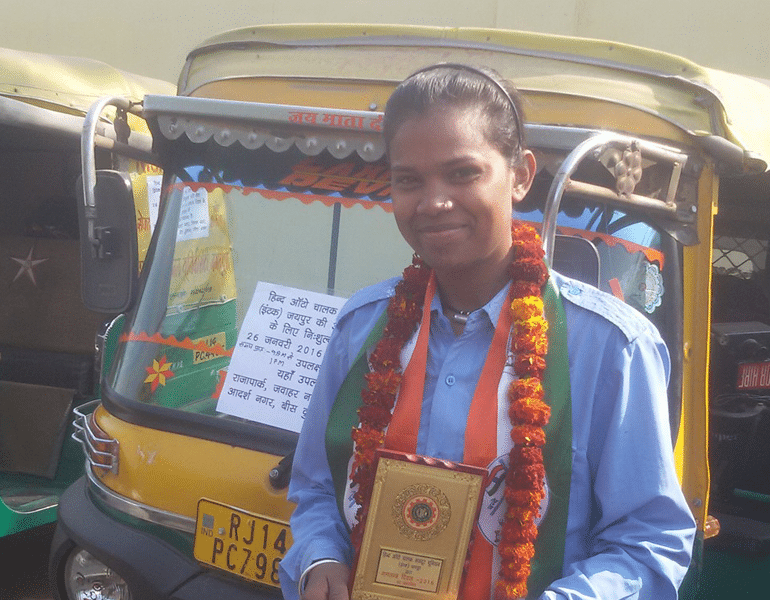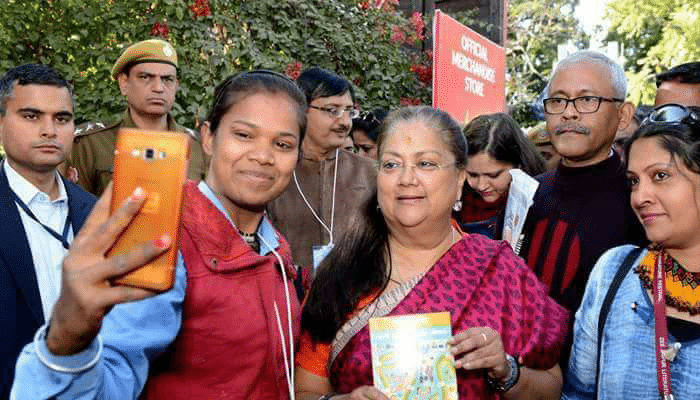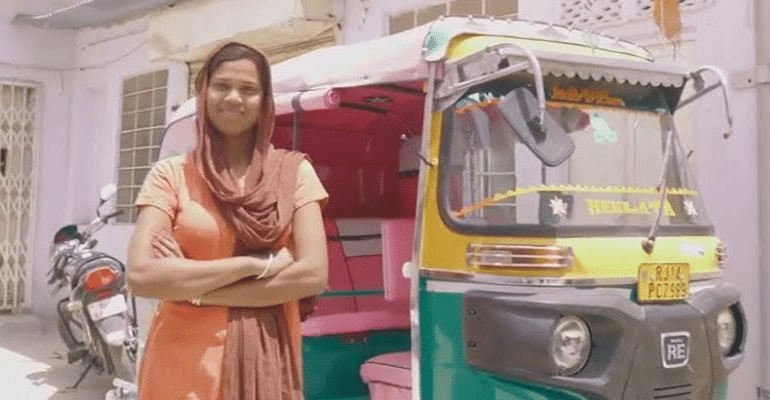It created a bit of sensation among male drivers and some even scoffed at her when she started going to the auto stand to park her auto alongside theirs. Life has been a rough ride for this 28-year-old woman from Jaipur but instead of wallowing in self-pity, she equipped herself with courage and fought back injustices.
In a heart-warming conversation with Life Beyond Numbers, Jaipur’s first woman auto-driver Hemlata Kushwaha Singh says, “I come from a very disadvantaged background but I never lost hope. I took charge of my life and have always fought injustice.”

What makes her story soul-stirring is that despite all odds- be it fighting a case against her abusive and alcoholic husband, battling money crisis or taking care of her 5-month old child or driving auto-rickshaw, she took out time for what she loved doing- dancing.
Fighting Abuse
In a society where a woman is oppressed now and then, one needs the courage to stand for themselves. Hemlata says, “An alcoholic husband beating his wife is a common story in India. Few women stay silent and accept this as their fate but not me and so I decided to fight.”
When her husband filed for divorce, she decided to take charge of her life and files a domestic violence case on him instead and asked for maintenance. She knew setting him free will let him to marry again and ruin another woman’s life.
Life was no cakewalk for this woman and she had to arrange money to pay the lawyer when hearings began. Whatever little money she made through the dance programmes, she used it to fight the case.
White Skin Fixation in India
“The problem in India is that light complexion is associated with power, beauty, and status. Therefore being a dark-skinned woman in this country means there will be always an opportunity gap,” says Hemlata.
For the last 15 years, she has been living in Jaipur with her family in a rented house. “Now, I live at my parent’s house and I am the only bread earner in the family. When you have financial restraints, looking after a child is not easy,” she says.
Even though she has experience in dancing, Hemlata was never given the opportunity of a front row dancer because of her skin color and physical appearance. Whenever there is a dancing assignment because of the society’s prejudices, her skills used to take a back seat. Her assignments were not regular and therefore she had to think of other ways to earn.
Balancing Work and Family
A regular 10-hour job was not feasible for Hemlata because she had to take care of her child but financial crunch in the family was difficult to deal with. “I couldn’t opt for 10 long hours at a stretch because I had to take care of my child and also go to court when summoned but without a steady job, it was very difficult for me to meet the basic needs,” she says.

She studied up to 8th grade and therefore growing up with little education made it more difficult for her to find employment. Therefore, she got herself a driving license but she hardly had any clue of how to drive vehicles.
While her brother helped her with the auto-driving in 2012 by lending his auto-rickshaw, her father loaned her money when she traveled to numerous places for performances.
On asking whether she finds it difficult to balance her work and family, Hemlata says, “I do get tired because of the hectic schedule and clarifying my choices to people around me but that didn’t stop me from doing my work as a driver. After dropping my child in school, I go back to the driving business and pick him up at noon. Then my father takes care of him and again I drive auto-rickshaw up to 7 pm.”
Being Jaipur’s first Woman Auto-rickshaw Driver
It was not easy in the beginning as people were skeptical to get inside the auto-rickshaw with a woman driver. Finally, in 2013, people from Azad Foundation took notice of her and decided to train her about the nuances of efficient driving. This changed Hemlata’s life forever and gave her hope and courage to create a niche for herself in the society.
She not only learned driving but she also came to know about the status of women in the society, self-defense techniques and protecting herself from verbal and physical abuse. This helped her regain self-confidence.

“I did feel opposition from the male drivers in the beginning while driving an auto-rickshaw. Some of them even made derogatory remarks, humiliated me just because I was a woman driver,” she says.
Life becomes difficult at times just because of your gender, says Hemlata. She recalls that once in a prepaid booth, the operation man made a suggestive gesture to her. Instead of stepping back and thinking that it has never happened, she decided to file a police complaint. Therefore, she was fighting two cases at the same time. The fact that she was making the right choices for herself made her adamant to fight for justice.
Seeing her courage, the auto-drivers’ association also has come forward to support her. Seeing her ability to deal with situations using intelligence and maturity, the Jaipur Metropolitan Auto-drivers Trade Union made the only female driver of the city its secretary. Further, she met an ex-CM of Rajasthan Vasundhara Raje to discuss the issues faced by her colleagues.
On asking about her future plans, Hemlata says that she doesn’t want to restrict herself to auto-rickshaw driving and want to drive heavy vehicles like a bus or a truck.
The hardships in her life were a lesson for her and it looks like she learned it well. “I never ran out of patience because I had to always think beyond myself and take care of my family. Therefore, I figured out that only through work I can bring myself out of these terrible situations,” she adds.
Hemlata says that she feels happy to see women drivers around her. “Women commuters, as well as drivers, always face risks but that should not stop anyone from working. When you accept women as a part of the society and respect their choices, you make them confident.”
“There is no tool for development more effective than the empowerment of women” and Hemlata stands as a brilliant example for many that how empowered women can empower women.

